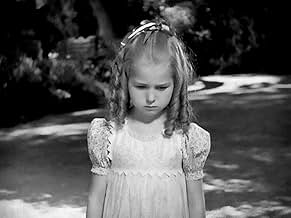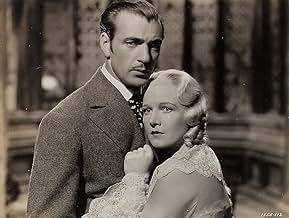VALUTAZIONE IMDb
6,9/10
2662
LA TUA VALUTAZIONE
Aggiungi una trama nella tua linguaA Victorian-era architect commissioned by the Duke of Towers to design his stables falls in love with the Duchess.A Victorian-era architect commissioned by the Duke of Towers to design his stables falls in love with the Duchess.A Victorian-era architect commissioned by the Duke of Towers to design his stables falls in love with the Duchess.
- Candidato a 1 Oscar
- 1 candidatura in totale
Herbert Evans
- Undetermined Secondary Role
- (scene tagliate)
Ferdinand Gottschalk
- Undetermined Secondary Role
- (scene tagliate)
Bodil Rosing
- Undetermined Supporting Role
- (scene tagliate)
Jack Adair
- Guard
- (non citato nei titoli originali)
Robert Adair
- Prisoner
- (non citato nei titoli originali)
Stanley Andrews
- Judge
- (non citato nei titoli originali)
Trama
Lo sapevi?
- QuizGary Cooper considered himself miscast in this film.
- BlooperIn the film's first scene, as Gogo is leaving his mother's bedroom he passes a mirror in which the reflection of a crew member is briefly visible.
- Citazioni
Mary - Duchess of Towers: But you needn't be afraid, Peter. The strangest things are true and the truest things are strange.
- ConnessioniFeatured in Visions of Light (1992)
Recensione in evidenza
Peter Ibbetson (1935)
An un-repenting romance, and I mean romance in the sense of two people being in true love for ever and ever no matter what. There is almost nothing less going on here, but who needs anything else? The best of it, in a way, is the fantasia near the end, some remarkable dream and surreal scenes with great effect. Also a great treat is seeing a young Ida Lupino as a sweet and somewhat self-absorbed young woman who is interested in our hero, played by Gary Cooper.
But Lupino is secondary, and once things get fully in gear in the present, it is Cooper's romance as Peter Ibbetson with Ann Harding, playing his childhood girlfriend, that makes it click. And no romantic stone is left untouched. By the time the movie gets to its final third you know what is happening, and then it takes a huge turn and things get both crazy and sentimentally moving. A romance turns violent, and then a crime turns first dark and then bright and almost religious (though never actually religious) and a sense of winning against all the odds is the final theme. This may strike some viewers as just wishful thinking and directorial excess, but it's so well done this isn't fair. The special effects are stunning, better than many recent effects, for sure.
And what about the filming and acting? All quite first rate. You might pigeonhole this as some kind of Depression-era escapist dream come true kind of film, but it really rises above that. It's about an impossible but not quite impossible ideal of absolute love, something that rises even above having a young Ida Lupino want you in your youth, or above giving up when chained to a wooden plank with a broken back. It's about hoping when it seems there is no hope.
But then, that's what people were doing everyday in the mid 1930s, after half a decade of terrible economic times (and without even knowing that another half a decade lay ahead). It's not a great film, but it's a great theme handled well enough to make you perk up. Someone else might have played Cooper's part with more subtlety or sophistication, but Harding is terrific in her role as rich kid turned angel. And Henry Hathaway, directing his heart out for a change, pulls off some great shifts in tone and temperament form one section of the film to the next, and narrowly avoids the sickly sweetness or downright camp that might have trapped another director. He may not have had a really classic film to his name, but among a good dozen very very good ones, from these 1930s dramas to some post-war film noirs, this is one of his best.
An un-repenting romance, and I mean romance in the sense of two people being in true love for ever and ever no matter what. There is almost nothing less going on here, but who needs anything else? The best of it, in a way, is the fantasia near the end, some remarkable dream and surreal scenes with great effect. Also a great treat is seeing a young Ida Lupino as a sweet and somewhat self-absorbed young woman who is interested in our hero, played by Gary Cooper.
But Lupino is secondary, and once things get fully in gear in the present, it is Cooper's romance as Peter Ibbetson with Ann Harding, playing his childhood girlfriend, that makes it click. And no romantic stone is left untouched. By the time the movie gets to its final third you know what is happening, and then it takes a huge turn and things get both crazy and sentimentally moving. A romance turns violent, and then a crime turns first dark and then bright and almost religious (though never actually religious) and a sense of winning against all the odds is the final theme. This may strike some viewers as just wishful thinking and directorial excess, but it's so well done this isn't fair. The special effects are stunning, better than many recent effects, for sure.
And what about the filming and acting? All quite first rate. You might pigeonhole this as some kind of Depression-era escapist dream come true kind of film, but it really rises above that. It's about an impossible but not quite impossible ideal of absolute love, something that rises even above having a young Ida Lupino want you in your youth, or above giving up when chained to a wooden plank with a broken back. It's about hoping when it seems there is no hope.
But then, that's what people were doing everyday in the mid 1930s, after half a decade of terrible economic times (and without even knowing that another half a decade lay ahead). It's not a great film, but it's a great theme handled well enough to make you perk up. Someone else might have played Cooper's part with more subtlety or sophistication, but Harding is terrific in her role as rich kid turned angel. And Henry Hathaway, directing his heart out for a change, pulls off some great shifts in tone and temperament form one section of the film to the next, and narrowly avoids the sickly sweetness or downright camp that might have trapped another director. He may not have had a really classic film to his name, but among a good dozen very very good ones, from these 1930s dramas to some post-war film noirs, this is one of his best.
- secondtake
- 11 giu 2011
- Permalink
I più visti
Accedi per valutare e creare un elenco di titoli salvati per ottenere consigli personalizzati
- How long is Peter Ibbetson?Powered by Alexa
Dettagli
- Data di uscita
- Paese di origine
- Lingue
- Celebre anche come
- Peter Ibbetson
- Luoghi delle riprese
- Azienda produttrice
- Vedi altri crediti dell’azienda su IMDbPro
- Tempo di esecuzione1 ora 25 minuti
- Colore
- Proporzioni
- 1.37 : 1
Contribuisci a questa pagina
Suggerisci una modifica o aggiungi i contenuti mancanti

Divario superiore
By what name was Sogno di prigioniero (1935) officially released in India in English?
Rispondi




































